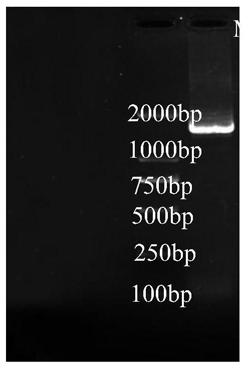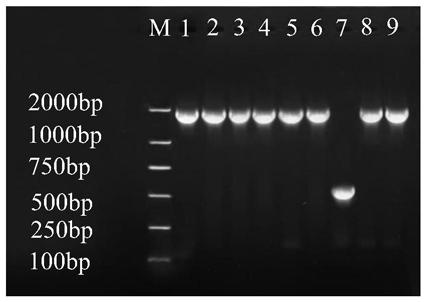Recombinant lactococcus lactis with laccase excreting capacity, and construction method and application thereof
A technology of Lactococcus lactis and laccase, which is applied in the field of genetic engineering of enzymes, can solve the problems of low copy number, low expression amount, and difficulty in realizing exocrine expression in a lactic acid bacteria expression system, and achieves good thermal stability and acid and alkali resistance. , the effect of increasing the yield
- Summary
- Abstract
- Description
- Claims
- Application Information
AI Technical Summary
Problems solved by technology
Method used
Image
Examples
Embodiment 1
[0047] Example 1 Construction of recombinant Lactococcus lactis with ability to secrete laccase
[0048] 1.1 Design and synthesis of CotA laccase gene and construction of pUC57-Simple-S-CotA recombinant cloning vector
[0049] The mature peptide of Bacillus subtilis CotA laccase was obtained through GenBank (accession number: FJ663050.1). Designed to add Usp45 secretion signal peptide and His tag to the CotA laccase sequence, according to the selection of restriction sites on the lactic acid bacteria expression vector pMG36e, add Xma I restriction sites and Hind III restriction sites to the N-terminus and C-terminus of the protein sequence respectively location. The designed sequence is optimized according to the codon preference of Lactococcus lactis, and the optimized sequence is shown in SEQ ID NO.3. The optimized CotA laccase sequence containing Usp45 secretion signal peptide was named S-CotA. The optimized CotA laccase sequence was entrusted to Hangzhou Baosai Biotechn...
Embodiment 2
[0090] Example 2 PCR amplification of CotA laccase gene
[0091] 2.1 Extraction of pUC57-Simple-S-CotA recombinant plasmid
[0092] Construct the pUC57-Simple-S-CotA recombinant cloning vector and transform it in E.coli DH5α, activate the recombinant strain on the LB solid medium containing 100 μg / mL ampicillin (Ampr), use the plasmid small extraction kit (EasyPureHiPure Plasmid MiniPrep Kit) to extract the pUC57-Simple-S-CotA recombinant plasmid, the specific operation steps were the same as 1.2.2 using the EasyPure HiPure Plasmid MiniPrep Kit to extract the pMG36e-S-CotA recombinant plasmid.
[0093] 2.2 Primer design for CotA laccase gene
[0094] According to the codon-optimized base sequence of the laccase gene in Bacillus subtilis (no Usp45 signal peptide) and the selection of restriction sites on the Escherichia coli expression vector pET-30a(+), primers were designed by using Primer 5.0 software. Synthesized by Sangon Bioengineering (Shanghai) Co., Ltd., and the synt...
Embodiment 3
[0106] Example 3 Identification of pMG36e-S-CotA recombinant expression vector
[0107] 3.1 PCR identification of positive clones
[0108] 1) Primer design
[0109] The primers were designed and identified according to the sequence on the pMG36e vector. The primers were synthesized by Sangon Bioengineering (Shanghai) Co., Ltd. The synthetic primers are shown in Table 4.
[0110] Table 4 Primer sequences
[0111]
[0112]
[0113] 2) PCR reaction system
[0114] The PCR reaction system and reaction conditions are shown in Table 5 and Table 6. After the PCR was finished, the PCR results were detected by 1% agarose gel electrophoresis.
[0115] Table 5 PCR reaction system
[0116]
[0117] Table 6 PCR reaction conditions
[0118]
[0119] 3) PCR identification results
[0120] The result is as image 3 As shown, the size of the amplified band is about 1900bp, which is consistent with the size of the expected band (1942bp), preliminarily proving that the recomb...
PUM
 Login to View More
Login to View More Abstract
Description
Claims
Application Information
 Login to View More
Login to View More - R&D
- Intellectual Property
- Life Sciences
- Materials
- Tech Scout
- Unparalleled Data Quality
- Higher Quality Content
- 60% Fewer Hallucinations
Browse by: Latest US Patents, China's latest patents, Technical Efficacy Thesaurus, Application Domain, Technology Topic, Popular Technical Reports.
© 2025 PatSnap. All rights reserved.Legal|Privacy policy|Modern Slavery Act Transparency Statement|Sitemap|About US| Contact US: help@patsnap.com



